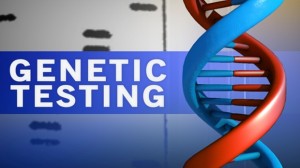Cancer Research is going in an entirely new direction based on genetic testing where tailored treatments can now focus on and  target specific cancer tumors.
target specific cancer tumors.
And to demonstrate this, we will review a recent (2014) success story from a young man (23-years) who submitted by faith and determination to the investigative process of genetic testing with tailored drug treatments for cancer cure.
Original story: Wall Street Journal: March 28, 2016
In February 2014, after a lengthy struggle with a head-cold, nosebleeds and body fatigue, Evan Johnson, a senior student at the University of North Dakota, decided to visit the Mayo Clinic when he began to have bruises and chest pain.
Genetic testing at the Mayo Clinic discovered an acute form of Myeloid Leukemia; a cancer disease that forms, grows, and can spread quickly through out the body.
Fortunate for Mr. Johnson, oncologists today are taking new directions with genetic testing to discover ways to make strong offensive action against cancer. The doctors know cancer can evolve to resist treatment(s), and they now use these complications as potential advantages to identify alternate cancer targets they can use different drug treatments on, as the cancer changes.
(Related Science)
The medical team working at the Mayo Clinic on Johnson’s case moved quickly in their investigative research to discover several effective treatments to use against the cancer genetic mutations that were pushing his disease. While his end story is successful, Evan had to endure a failed stem cell transplant, six various prescribed courses of medical treatment, four cancer relapses and other life-threatening problems that occurred when treatment went beyond the desired effect.
For Evan’s mother, Carol Johnson:
We truly felt like we were in a war. We didn’t know where the [cancer] enemy was at any given moment and what means [the cancer] was going to use to attack us next.
After nine months into his cancer treatment, Evan’s leukemia evolved and developed a new mutation, unexpectedly! The change allowed the cancer to escape the cure of the treatment being administered. But, the deviation in the cancer gave his oncologists a new target that was vulnerable to other cancer fighting drugs. Mr. Johnson’s doctors modified and fine-tuned their treatment for him and managed to defeat the leukemia; which cleared the way for Evan to receive a second, successful stem cell transplant. Consequently, Evan Johnson has been cancer free for more than a year.
Genetic Testing: Cancer Treatment’s
New Direction
Dr. Pashtoon Kasi, an oncologist at the Rochester,Minn.-based Mayo Clinic, is a team-member that assisted in Evan Johnson’s medical care. Dr. Kasi says the medical team could see the cancer evolution happen by regular genetic testing, which allowed Mr. Johnson’s treatment to be customized to his particular need. “Personalization in real time… This is where oncology is headed down the line,” says Dr. Pashtoon Kasi.
According to Dr. Jose Baselga, chief physician at Memorial Sloan Kettering Cancer Center in New York:
A decade ago, we were shooting in the dark. If first-line or second-line treatments failed, we either had nothing to do next, or what we did was totally disconnected with the biology of the disease.
With today’s technology cancer patients with advanced forms of the disease can be treated at major health centers, expecting their tumors to be genetic sequenced. The genetic testing provides a  hope in finding a match to the many new drugs that target exactly and stop the cancer mutations that stimulate the cancer’s growth. Good matches can produce excellent results with dramatic effect at reducing tumors, but “precision drug treatment” is not always a cure. Sometimes the treatment is thwarted when a tumor evolves. This forces oncologists to seek the identity of new mutations that can be stopped with effective treatment.
hope in finding a match to the many new drugs that target exactly and stop the cancer mutations that stimulate the cancer’s growth. Good matches can produce excellent results with dramatic effect at reducing tumors, but “precision drug treatment” is not always a cure. Sometimes the treatment is thwarted when a tumor evolves. This forces oncologists to seek the identity of new mutations that can be stopped with effective treatment.
Oncologists, Genetic Testing and New Cancer Treatments: A Game of Whack-a-Mole
The research process of identifying new mutations and matching the next precision drug treatment to stop cancer growth is.. “like a Whack-a-Mole game,” according to Dr. Baselga. Each attempt to solve the cancer problem is piece-meal resulting only in temporary or minor improvement. And as new mutations occur, the medical strategy is to find a new treatment (hammer) to hit it with.
But the real challenge to this approach of medical treatment is finding drugs that treat cancer-causing mutations; there just aren’t that many, yet. For example, a drug found that works on a patient with melanoma might not be successful on a colon-cancer patient, even if they have the same mutation. And, sometimes a drug that is not yet approved for the type of cancer being treated is suggested based upon DNA tests that match the tumor mutation, which jeopardizes the possibility of compensation for expensive drugs.
Regarding this method of cancer treatment, Dr. Kasi says:
It’s not for every patient or [form of] cancer. But as we develop more drugs and understand more [treatment] pathways, it would be a reasonable option for a lot of our patients.
Evan Johnson returned to his home after spending 17 months at the Mayo Clinic enduring medical Whack-a-Mole, being released with a good chance of sustained, durable remission of Myeloid Leukemia and the cancer’s genetic mutations.
An account of Evan’s case has been published by Dr. Pashtoon M. Kasi, Mark R. Litzow, Mrinal M. Patnaik, Shahrukh K. Hashmi, and Naseema Gangat in the journal:
Leukema Research Reports (January 2016)
